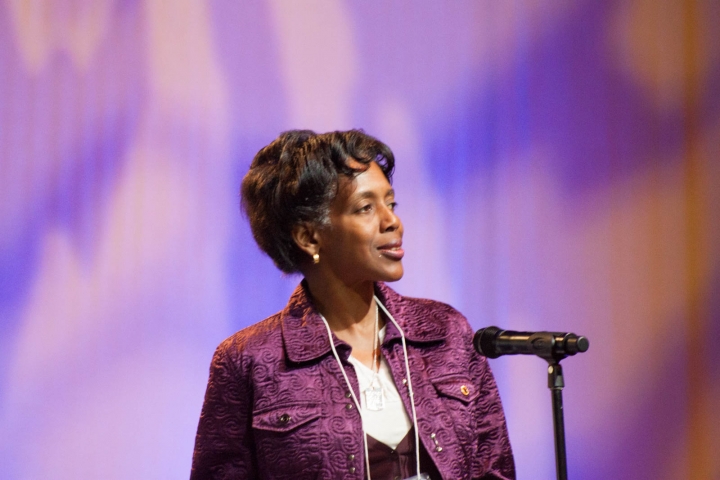news article

Leadership Report aims to upgrade the experience at the table
June 3, 2016 / By Shannon Hodson / .(JavaScript must be enabled to view this email address)
The banquet table of the Upper New York Annual Conference session is set – and it’s no ordinary meal.
“It is a table filled with delicacies you can’t even imagine,” a narrator recites at the opening of the Leadership Report. “The blessing is before us.”
“No matter what your gift is, no matter who you are; you are invited to the table that Christ has set. Take a seat, and not at the kids’ table, not today,” said the Rev. Bill Gottschalk-Fielding – Conference Director of Connectional Ministries and Executive Assistant to the Bishop.
Cornerstone District Superintendent the Rev. Sherri Rood suggested that as we pull our chairs up to the table, we might reflect on the main work of the Conference and how it plays out.
“Simply put, our Conference is here to equip local churches to live the mission by increasing the capacity of Christ-following leaders,” she said.
Riley O’Flynn, laity, used favorite regional foods – the Garbage Plate from Nick Tahou’s in Rochester, spiedies at Lupos in Binghamton, and chicken riggies at Teddy’s in Rome – as reflections of one area in which local communities thrive. Then she explained that the Conference strives to be local as well.
The Rev. Aaron Bouwens, Conference Director of Vital Congregations, piggybacked off O’Flynn’s analogy, adding the farm-to-table concept to describe local churches.
“There is a growing trend in the restaurant industry toward locally-grown and prepared meals,” he said. “Farm-to-table has become synonymous with the best of the best. We believe the local church is where disciples are made, nurtured, and sent into mission.”
Rev. Bouwens described the strategy of developing training resources that are customized to suit individual districts as one way to help create local leaders.
“A great example of this is the Oneonta District’s Compass Project,” he said. “I had a conversation with Oneonta’s District Leadership Team, and together, we developed a way for small groups in the district to creatively engage the eight principles of Hand to Plow.”
These groups will meet the first hour to focus on loving God, using “The Disciple’s Path” by James Harnish as a guide. During the second hour, groups will learn together through a brief video session and reflection questions. Groups will conclude each session by asking members to reflect on how they will lead in light of the time they just spent.
Susan Ranous, Financial Advisory Consulting Team (FACT) Project Manager, also mentioned the need for local churches to be given resources to help them thrive.
“The Stewardship Foundation will offer resources, education, and encouragement to local congregations as well as helping us provide ministry and mission in the local church and beyond,” she said.
The Rev. Vonda Fossitt, pastor at the High Street United Methodist Church in Binghamton, referred to the way in which gourmet restaurants offer upgrades to their menu.
“Here in the Upper New York Conference, we’ve been very intentional about trying to upgrade the experience at the table,” she said.
Rev. Fossitt gave examples of two local churches that are upgrading this experience. The Whitney Point UMC has increased connection among members of the congregation by having regular dinners, and the Bergen United Methodist Church has focused on the way in which small groups and retreats have been providing “living water that meets the deep thirst people have.”
Leadership is also involved in planting new churches. A video about Casa de Dios in Syracuse was played, showcasing how this Spanish-speaking new faith community has grown from seven people to more than 40 people. A video about the Pillar in Rochester, was also shown, illustrating how this new faith community has invited people to come to the table through concerts, comedy shows, and festivals.
“There is no reason not to leave this table full and with enough to share,” said Rev. Gottschalk-Fielding.